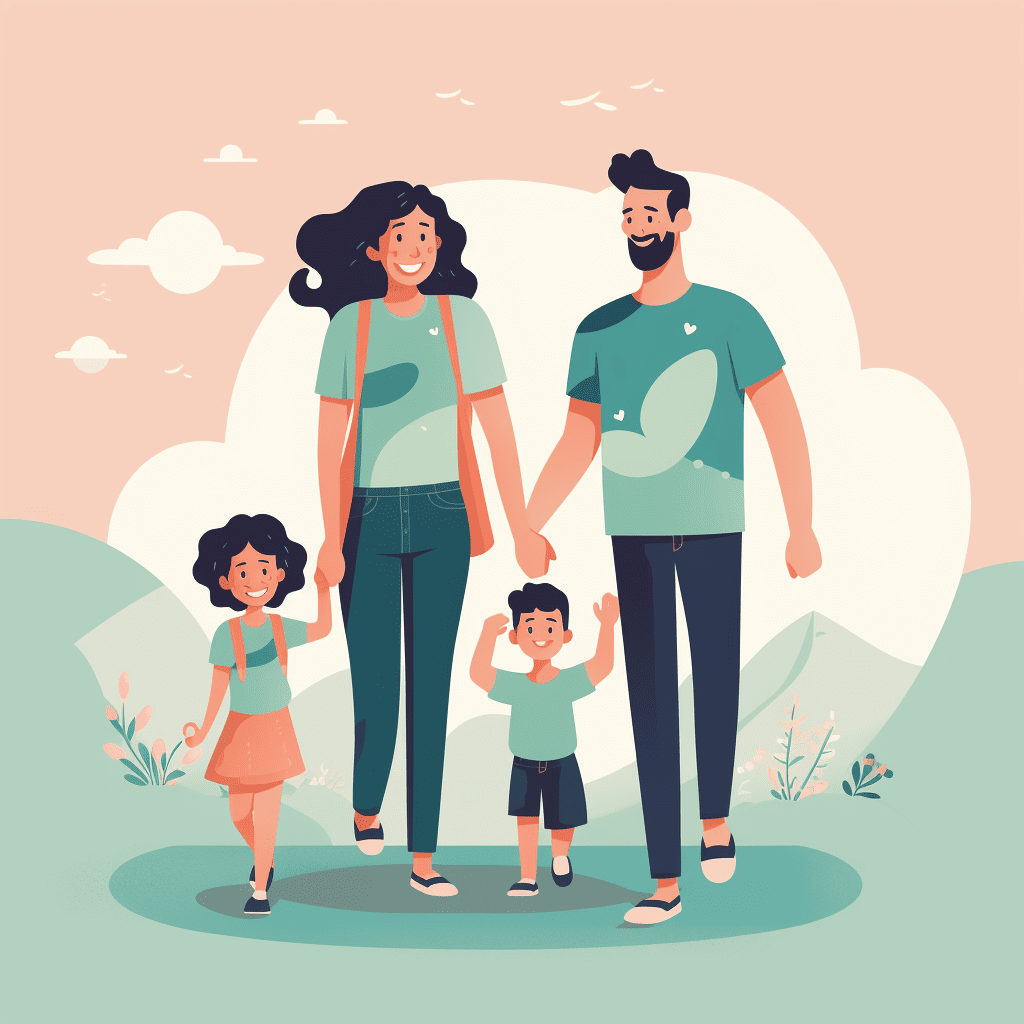Ever wonder why you think the way you do or why certain norms feel almost second nature to you? You didn't come up with these ideas on your own; they were shaped by the world around you. In this article, you're going to learn about the critical forces that mold your behavior, values, and beliefs from a young age to adulthood.
Agents of socialization are the key institutions, groups, and individuals that influence your development and help you navigate the maze of societal norms, customs, and expectations.
By the end of this read, you'll have a solid grasp on the elements that have shaped who you are and how they work in concert to form the complex structure of society.
What Are the Agents of Socialization?

What exactly are agents of socialization? Simply put, these are the different influences that shape you into the person you are today. They're like the architects of your identity, sketching out the blueprint of how you think, feel, and interact with the world.
The term "socialization" refers to the lifelong process of learning the rules, norms, and values of your community. It's a bit like learning the rules of a game; you can't really play effectively until you understand how it works. Agents of socialization are the "coaches" guiding you through this game of life.
It's not just one or two things that mold you. Multiple agents work together, each contributing a unique piece to the puzzle that is you. Some are more obvious, like your family or school, while others, such as media and religion, work more subtly.
What kind of emotional and practical support a person receives will be influenced by what agents they have in their lives. For instance, parents social class influences children behaviors because it will contribute to how much time and attention the parents can spend with their child.
There are also formal and informal social institutions. Formal social institutions are things like schools and religious institutions. Informal social institutions are things like peer groups, media consumption, and a society's material culture.
Additionally, an agent of socialization can be either a primary or secondary agent.
Primary agents of socialization, like your family, are the early and immediate influencers in your life. They lay down the basics and give you your first sense of identity.
On the other hand, secondary agents of socialization, such as schools and peer groups, come into play as you grow and begin to step out into the world. While primary agents set the foundation, secondary agents add complexity, challenging and building upon the initial values and beliefs you've absorbed.
Let's look at the agents in the general order they appear in your life.
First Agent: Family

Let's start where it all begins: your family. Before you even stepped foot in a school or made your first friend, your family was already shaping your views and behaviors.
Your parents or caregivers teach you the basic skills you need to function. We're talking about fundamental stuff here, like language and basic manners. These are your building blocks, the foundation on which everything else will be built.
It's not just about socializing children learning to say "please" and "thank you," though. Your family instills in you the values, beliefs, and cultural norms that guide your actions throughout your life. The family teaches everything from parental gender norms to how children participate in the family structure and how the age norms established impact the child's role.
This is not to say that your family's influence is set in stone. As you grow, other agents of socialization start coming into the picture. But the family's role remains pivotal. They're your first teachers, and their lessons often stick with you for a lifetime.
Second Agent: Education

After your family has laid the groundwork, the next major player to enter the scene is usually the educational system.
Schools are a type of secondary agent of socialization. While your family focuses on basic values and beliefs, schools introduce you to a broader world. You learn not just math and science but also how to interact with people from different backgrounds.
Teacher expectations, grading systems, and even the hidden curriculum—that is, the unwritten, unofficial lessons that you pick up—play roles in socializing you. The school and classroom rituals are a big part of the socialization process too.
How teachers evaluate students leaves a big impact - are they nice, strict, forgiving? That will teach the child what to expect in the rest of their lives regarding feedback and development.
Hidden curriculum prepares children to understand social norms. How kids act on the playground teach younger children things like gender norms,
Class related behaviors also teach one to uphold gender norms, emphasize obedience, and prepare kids for the "adult world".
Schools teach you about hierarchy, competition, and cooperation. They show you that actions have consequences, like grades or detentions.
So, as you go through the educational system, you’re not just collecting facts and skills. You're picking up social cues and learning how to function in a community. And just like that, another layer gets added to the complex person that is you.
Third Agent: Friends
Your peers are the people around your age who have interests, social positions, or backgrounds similar to yours. Think of peer groups as mirrors that reflect back aspects of yourself, but with a few tweaks and differences thrown in.
Peer group socialization begins as early as children take part in informal institutions. Whether it's daycare or time at the park with other kids, these peer groups provide adolescents with various norms. Who children spend time with and in what social institutions will greatly influence their character.
In many ways, peer groups serve as a testing ground. Your friends provide a space where you can try out new ideas, attitudes, and even identities. This is where you figure out what works and what doesn’t.
Peer pressure is a part of this picture; it can be both positive and negative, pushing you to conform to the group’s norms.
Here's the thing: While families and schools usually aim to socialize you in a structured way, peer groups offer a kind of 'free-form' socialization. There are fewer rules and more room for experimentation.
However, the influence of peers can sometimes conflict with what you've learned from primary agents like family or secondary agents like schools.
Fourth Agent: Media
Now, let’s shift gears to an agent that you might not immediately think of as a socializer: the media. Whether it's the shows you binge-watch, the news you follow, or the social media platforms you scroll through, media plays a subtle but powerful role in shaping your view of the world.
Media literacy is crucial here. This means being able to think critically about what you see and hear in the media.
For instance, how do commercials shape your idea of what's "cool" or "important"? Or how do news outlets influence your opinions? Mass media doesn't just offer stories and products; it sells values, viewpoints, and lifestyles.
While family, schools, and peers are like hands-on coaches in your life, the media is a bit more distant. Its effects can be more subtle, but also far-reaching, affecting not just you but entire societies at large.
A society's material cultures socialize children differently from each other. Material culture refers to the physical objects, resources, and spaces that people use to define their culture and environment. These can range from buildings and artwork to technology and clothing, serving as tangible expressions of a society's values, beliefs, and customs.
A child's behavior patterns profoundly influence what media and material culture they engage with, as does their family, peer groups, and other social context. But what media they have access to depends on where in the world they are.
Swedish children will have different material culture and mass media than Japanese children, for instance. So while the media is a big part of someone's socialization, it is very much an informal teaching mode.
With the average person spending a significant part of their days consuming media of some kind, we see how much of an impact this can have on their development.
Fifth Agent: Religious Institutions

Whether it’s a church, temple, mosque, or any other place of worship, these spaces often provide more than just spiritual guidance. They're like the moral compass on your life's journey, pointing you toward what the community sees as right or wrong.
Religious teachings often offer a set of rules or guidelines. Just like how a school has a syllabus, religious institutions have doctrines or holy books that outline ethical behavior and social norms. These teachings influence how you think about big topics like life, death, and your place in the universe.
The sense of community in these religious spaces is also crucial. They offer a supportive network, not unlike what a family or peer group provides. The primary difference is that this support often comes with an ethical or spiritual framework.
Essentially, it's another layer of socialization, one that can sometimes echo what you've learned at home, or challenge it, enriching your moral and ethical understanding.
Sixth Agent: Workplace
Now that you’ve got a good grasp of how various agents shaped your younger years, let's look at a place where adult socialization commonly happens: the workplace.
The workplace teaches you about hierarchy and the value of teamwork. You learn how to navigate power dynamics and office politics, sort of like an advanced level of the schoolyard, but with paychecks instead of grades.
You also get to experience diversity, meeting and working with people from various backgrounds, which adds different shades to your social palette.
The term "occupational socialization" might sound like jargon, but it simply refers to the way you adapt to the norms and expectations of your workplace. Just like you had to learn how to be a student in school, you have to learn how to be an employee, a manager, or a leader in the world of work.
Seventh Agent: Life Milestones

As we wrap up our exploration of agents of socialization, let's not overlook something crucial: life events and transitions. We're talking about significant events like graduation, marriage, becoming a parent, or even experiencing loss or hardship.
These events force you to adapt and grow, challenging the norms and values you've picked up from other agents of socialization.
For instance, becoming a parent makes you a primary agent of socialization for someone else. You now pass on values and norms, coming full circle in the socialization process.
Other transitions, like entering retirement, shift your role in society and make you reevaluate your self-concept.
While these milestones might seem like an effect of the socialization you've already been through (i.e. choosing to marry or not), they also help mold you moving forward.
The History of Socialization Theories
So, you're interested in how people turn out the way they do. You're not alone! The idea of socialization—how we make children learn to fit into society—has been a hot topic for thinkers, researchers, and even everyday people like parents and teachers for quite a while.
Let's start with Emile Durkheim, a French sociologist active in the late 19th and early 20th centuries. He is often credited with laying the groundwork for modern sociology. Durkheim emphasized the role of social institutions like education in fostering social solidarity and shared values.
Other early theories in the late 19th and early 20th centuries, like those by Charles Cooley and George Herbert Mead, further laid the groundwork. They introduced concepts like the "looking-glass self"—which is basically how you see yourself based on how you think others see you.
Erik Erikson, a German-American psychologist active in the mid-20th century, expanded our understanding by introducing the idea of psychosocial stages. Erikson believed that each stage of life comes with its own social and emotional challenges, influencing our personality and behavior.
In the 1960s, Canadian sociologist Erving Goffman introduced the concept of "dramaturgy," suggesting that social life is like a theatrical performance where we play different roles. This idea touched upon how agents of socialization teach us to perform these roles effectively.
More recently, in the late 20th and early 21st centuries, researchers like Patricia Hill Collins have explored how socialization is affected by intersecting factors like race, class, and gender. Collins' work has been pivotal in introducing the idea of intersectionality into socialization theory.
In modern sociology, we recognize that someone's social class, economic class, and gender will all have an impact on what society expects of them, and thus how they are taught to behave. These social factors affect a person's role and character development.
For instance, working class parents will likely send their kids to state run education systems because that's all they can afford. Whereas middle class parents tend to send their children to more specialized institutions. And wealthy parents tend to send their kids to private schools.
Class and other societal factors will impact the adolescent peer influences a child has access to. Organized religion fosters different socialization than someone who comes from a family who isn't religious.
Socialization includes teaching all of the norms that a society expects, and also the ones that a particular family desires. So two children raised in the same town may have wildly different socialization.
That's not to say that everyone is limited by their place in society. But there are sociologists and psychologists who have taken issue with the Agents of Socialization theory.
Challenges to the Agents of Socialization Theory
So far, you've been learning about the generally accepted ideas on agents of socialization. But like any field of study, there are alternative viewpoints that challenge mainstream understanding.
One of these alternative views is individual agency, the idea that you're not just a passive recipient of socialization. Instead, you actively engage with and interpret the messages from these agents.
Another perspective that shakes up traditional ideas is the interactionist approach. This view holds that socialization is a two-way street, with individuals also influencing the agents that are supposed to be shaping them. This approach puts more emphasis on the dynamic, ever-changing nature of the socialization process.
Then there’s cultural relativism, which challenges the idea that the agents of socialization are universal. What might be a significant agent in one culture may not hold the same weight in another. For example, in collectivist societies, the extended family might play a much larger role in socialization than in individualistic societies.
Frequently Asked Questions (FAQ)
Agents of socialization are the key influences that help shape our beliefs, values, and behaviors as we grow. These can range from family and school to media and workplace settings.
No, the impact and relevance of different agents can vary from person to person and culture to culture. For instance, religious institutions might play a bigger role in socialization in certain societies compared to others.
3) What is individual agency?
Individual agency is the concept that people are not just passive recipients of socialization. Instead, they actively engage with and interpret the messages they receive from various agents.
4) What is the interactionist approach?
The interactionist approach suggests that socialization is a two-way street. Not only do individuals get influenced by agents like family and schools, but they also influence these agents in return.
Life events such as marriage, parenthood, or retirement serve as significant milestones that require us to adapt and reshape our understanding of social norms and values.
Yes, media can be a subtle but impactful agent that influences our perceptions, attitudes, and behaviors, often in ways we may not immediately recognize.
Absolutely. Workplaces teach us about hierarchy, teamwork, and expose us to a diversity of opinions and backgrounds. They play a vital role in adult socialization.
8) Do religious institutions only provide spiritual guidance?
No, religious institutions often offer a set of ethical and moral guidelines that influence your behavior and thinking, extending their role beyond mere spiritual guidance.
Yes, theories like individual agency, interactionist approach, and cultural relativism offer different perspectives that challenge and enrich the mainstream understanding.
Recognizing the roles of different agents in shaping your thoughts, actions, and beliefs can provide valuable insights into your own behavior and help you understand the functioning of society as a whole.
Conclusion
You've journeyed through a complex landscape, from the nurturing environment of your family to the larger influences of educational systems, peer groups, media, religious institutions, workplace, and life events.
All of this combines to make you unique, influenced but not dictated by these various threads.
Understanding this complex web is not just academic. It's practical. It gives you insight into why you think the way you do and why society functions as it does. Armed with this understanding, you can become a more informed, empathetic individual.
As you move forward, remember that socialization is an ongoing process. New threads will be added to your tapestry, and old ones might fade, but they all contribute to who you are and how you interact with the world.



